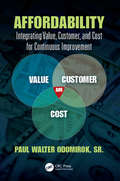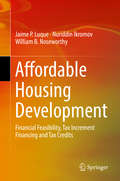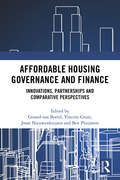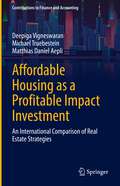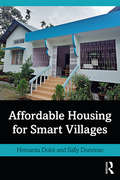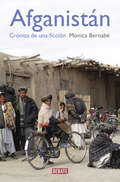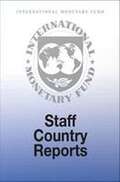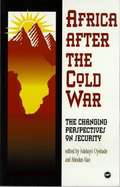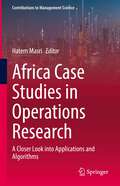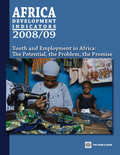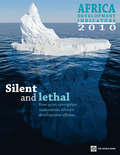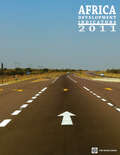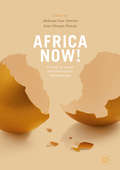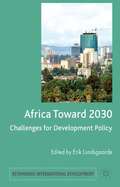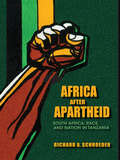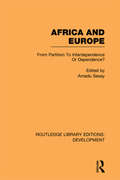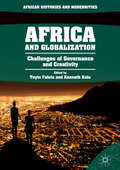- Table View
- List View
Affordability: Integrating Value, Customer, and Cost for Continuous Improvement (Continuous Improvement Series)
by Paul Walter Odomirok, Sr.Affordability is a new concept that allows the implementation of Continuous Improvement for any organization. It encapsulates contemporary methods that improve product and service profitability, increases market share, value, speed, quality and capability, and cuts down on cost. This new method addresses the needs of growing, improving, and sustaining an organization. It provides a framework and foundation for launching improvement initiatives, deploying continuous improvement, and maintaining the cultural habits and behaviors required to continue such efforts. Case studies from a variety of industries, businesses, and institutions are provided.
Affordable Cleanup?: Opportunities for cost reduction in the decontamination and decommissioning of the nation's uranium enrichment facilities
by Committee on Decontamination Decommissioning of Uranium Enrichment FacilitiesThe Energy Policy Act of 1992 called on the National Academy of Sciences to conduct a study and provide recommendations for reducing the costs of decontaminating and decommissioning (D&D) the nation's uranium enrichment facilities located at Oak Ridge, Tennessee; Raducah, Kentucky; and Portsmouth, Ohio. This volume examines the existing plans and cost estimates for the D&D of these facilities, including such elements as technologies, planning and management, and identifies approaches that could reduce D&D costs. It also assesses options for disposition of the large quantities of depleted uranium hexafluoride that are stored at these sites.
Affordable Excellence
by William A. HaseltineThis is the story of the Singapore healthcare system: how it works, how it is financed, its history, where it is going, and what lessons it may hold for national health systems around the world. Singapore ranks sixth in the world in healthcare outcomes, yet spends proportionally less on healthcare than any other high-income country. This is the first book to set out a comprehensive system-level description of healthcare in Singapore, with a view to understanding what can be learned from its unique system design and development path.The lessons from Singapore will be of interest to those currently planning the future of healthcare in emerging economies, as well as those engaged in the urgent debates on healthcare in the wealthier countries faced with serious long-term challenges in healthcare financing. Policymakers, legislators, public health officials responsible for healthcare systems planning, finance and operations, as well as those working on healthcare issues in universities and think tanks should understand how the Singapore system works to achieve affordable excellence.
Affordable Excellence: The Singapore Healthcare Story
by William A. HaseltineThis is the story of the Singapore healthcare system: how it works, how it is financed, its history, where it is going, and what lessons it may hold for national health systems around the world. Singapore ranks sixth in the world in healthcare outcomes, yet spends proportionally less on healthcare than any other high-income country. This is the first book to set out a comprehensive system-level description of healthcare in Singapore, with a view to understanding what can be learned from its unique system design and development path.The lessons from Singapore will be of interest to those currently planning the future of healthcare in emerging economies, as well as those engaged in the urgent debates on healthcare in the wealthier countries faced with serious long-term challenges in healthcare financing. Policymakers, legislators, public health officials responsible for healthcare systems planning, finance and operations, as well as those working on healthcare issues in universities and think tanks should understand how the Singapore system works to achieve affordable excellence.
Affordable Housing Development: Financial Feasibility, Tax Increment Financing and Tax Credits
by Jaime P. Luque Nuriddin Ikromov William B. NoseworthyThis book explains the nuts and bolts of affordable housing development. Divided into two complementary sections, the book first provides an overview of the effectiveness of existing federal and state housing programs in the United States, such as the LIHTC and TIF programs. In turn, the book’s second section presents an extensive discussion of and insights into the financial feasibility of an affordable real estate development project. Researchers, policymakers and organizations in the public, private and nonprofit sectors will find this book a valuable resource in addressing the concrete needs of affordable housing development. “Luque, Ikromov, and Noseworthy’s new book on Affordable Housing Development is a “must read” for all those seeking to address the growing and vexing problem of affordable housing supply. The authors provide important insights and practical demonstration of important financial tools often necessary to the financial feasibility of such projects, including tax-increment financing and the Low-Income Housing Tax Credit. Further, the authors provide important backdrop to the affordability crisis and homelessness. I highly recommend this book to all who seek both to articulate and enhance housing access.” By Stuart Gabriel, Arden Realty Chair, Professor of Finance and Director, Richard S. Ziman Center for Real Estate at UCLA"Over several years Jaime Luque, Nuriddin Ikromov and William Noseworthy applied their analytical bent, and no small measure of empathy, to homelessness as actually experienced in Madison, Wisconsin – and they inspired multiple classes of urban economics students to join them. “Homelessness” is a complex web of issues affecting a spectrum of populations, from individuals struggling with addiction or emotional disorders, to families who’ve been dealt a bad hand in an often-unforgiving economy. Read this book to follow Jaime, Nuriddin, and William as they evaluate a panoply of housing and social programs, complementing the usual top-down design perspective with practical analysis of the feasibility of actual developments and their effectiveness. Analytical but written for a broad audience, this book will be of interest to anyone running a low-income housing program, private and public developers, students, and any instructor designing a learning-by-doing course that blends rigor with real-world application to a local problem."By Stephen Malpezzi, Professor Emeritus, James A. Graaskamp Center for Real Estate, Wisconsin School of Business, University of Wisconsin-Madison, and Dean, Weimer School of the Homer Hoyt Institute.
Affordable Housing Governance and Finance: Innovations, partnerships and comparative perspectives
by Vincent Gruis Joost Nieuwenhuijzen Ben Pluijmers Gerard BortelThere is a large shortage of affordable housing across Europe. In high‐demand urban areas housing shortages lead to unaffordable prices for many target groups. This book explores innovations to support a sufficient supply of affordable and sustainable rental housing. Affordable housing is increasingly developed, financed and managed by a mix of market, state, third sector and community actors. Recent decades in large parts of the Western world have consecutively shown state-dominated, non-profit housing sectors, an increased role for market forces and the private sector, and the rise of initiatives by citizens and local communities. The variety of hybrid governance and finance arrangements is predicted to increase further, leading to new affordable housing delivery and management models. This book explores these innovations, with a focus on developments across Europe, and comparative chapters from the USA and Australia. The book presents new thinking in collaborative housing, co-production and accompanying finance mechanisms in order to support the quantity and the quality of affordable rental housing. Combining academic robustness with practical relevance, chapters are written by renowned housing researchers in collaboration with practitioners from the housing sector. The book not only presents, compares and contrasts affordable housing solutions, but also explores the transferability of innovations to other countries. The book is essential reading for researchers and professionals in housing, social policy, urban planning and finance.
Affordable Housing and Low Income Housing Tax Credits in the United States
by Nicolas P. Retsinas Arthur I SegelIndustry and Background Note
Affordable Housing as a Profitable Impact Investment: An International Comparison of Real Estate Strategies (Contributions to Finance and Accounting)
by Matthias Daniel Aepli Deepiga Vigneswaran Michael TruebesteinThe challenges of affordable housing are manifold. However this presents an opportunity to private investors, real estate companies, and developers. With the growing global trend for impact-based investments, many institutional investors have begun to consider the merits of this asset class. This book examines not only the profitability of these assets, but also whether these assets rely on government subsidy. It discusses why investors have become more interested in this product and which investment criteria influence the financial performance of these assets. The authors employed a mixed method approach to collect data at two tiers, first through surveys and afterwards through interviews of 8 firms (3 publicly listed companies, 3 private equity companies, 1 foundation, and 1 state bank) across Germany, the United Kingdom, and the United States. Investment criteria are analyzed using inferential statistics, specifically the Hierarchical Algorithm Cluster Analysis. The financial characteristics of the companies are examined and compared using descriptive statistics and the qualitative interview output is explored using the thematic Latent Coding Analysis. Furthermore, the book explains how the bond-like nature of affordable housing is a profitable impact investment option, and how this strategy is particularly worthwhile for institutional investors. It also describes that profitability of affordable housing products is not dependent on subsidy. Still, affordable housing products supported by government incentives in the United Kingdom and United States are most attractive. The book illustrates six important investment strategies identified by veterans in this field to have an influence on the financial feasibility of affordable housing products.
Affordable Housing for Smart Villages
by Sally Donovan Hemanta DoloiThis book initiates a fresh discussion of affordability in rural housing set in the context of the rapidly shifting balance between rural and urban populations. It conceptualises affordability in rural housing along a spectrum that is interlaced with cultural and social values integral to rural livelihoods at both personal and community level. Developed around four intersecting themes: explaining houses and housing in rural settings; exploring affordability in the context of aspirations and vulnerability; rural development agendas involving housing and communities; and construction for resilience in rural communities, the book provides an overview of some of the little understood and sometimes counter-intuitive best practices on rural affordability and affordable housing that have emerged in developing economies over the last thirty years. Drawing on practice-based evidence this book presents innovative ideas for harnessing rural potential, and empowering rural communities with added affordability and progressive development in the context of housing and improved living standards. For a student aspiring to work in rural areas in developing countries it is an introduction to and map of some key solutions around the critical area of affordable housing For the rural development professional, it provides a map of a territory they rarely see because they are absorbed in a particular rural area or project For the academic looking to expand their activities into rural areas, especially in rural housing, it provides a handy introduction to a body of knowledge serving 47% of the world's population, and how this differs from urban practice For the policy makers, it provides a map for understanding the dynamics around rural affordability, growth potential and community aspirations helping them to devise appropriate intervention programs on rural housing and development
Affordable Housing in the United States
by Gregg Colburn Rebecca J WalterAffordable Housing in the United States addresses the issue of affordability of housing, or the lack thereof, going beyond conventional policy discussions to consider fundamental questions such as: What makes housing affordable and for whom is it affordable? What are the consequences of a lack of affordable housing? How is affordable housing created? And what steps can be taken to ensure all people have access to affordable housing?With the understanding that different households face different challenges, the book begins by breaking down the variables relevant to the study of affordable housing, including housing costs, household income, geographic location, and market forces, to help readers understand and quantify affordability at the individual and societal level. Part II examines the consequences of unaffordable housing, highlighting racial inequities in housing access and affordability, and multiple forms of housing precarity including eviction and homelessness. Part III explores the entities involved in providing affordable housing such as local and federal governments, regulatory agencies, non-profit organizations, and for-profit developers. In Part IV, case studies from US cities demonstrate the complex web of organizations, policies, and market conditions that influence housing affordability, revealing substantial regional variations in access and policy response. Part V proposes a future roadmap and outlines four potential states with radically different outcomes for the affordable housing system in the United States.An ideal book for graduate and undergraduate courses in economics, public policy, real estate finance and development, sociology, and urban planning, this title will also be of value to professionals and policymakers seeking to understand and improve housing affordability and access.
Affordable Interior Design: High-End Tips for Any Budget
by Betsy Helmuth Dov PlawskyLive in luxury—on a budget. Homeowners and renters of all means dream of having a beautiful home. The media makes it look so easy, but many of us have less to work with and still long to live in style. Affordable Interior Design makes luxury an affordable reality. In this DIY home decorating handbook, Helmuth reveals insider tips and her tried-and-tested methods for choosing colors, creating a gallery wall, how to use accent tables, entry benches, rugs, and more! Helmuth has shared her affordable design advice and step-by-step approaches with millions through live teaching workshops, guest columns, television appearances, and interviews. Now, she has distilled her expertise into this practical guide. The chapters follow her secret design formula and include creating a design budget, mapping out floor plans, selecting a color palette, and accessorizing like a stylist. It’s time to start living in the home of your dreams without maxing out your credit cards. Learn how with Affordable Interior Design!
Afforestation, Reforestation and Forest Restoration in Arid and Semi-arid Tropics: A Manual of Technology & Management
by Panna Ram SiyagThe book is a comprehensive manual of practice for execution of afforestation and tree planting programmes in arid and semi-arid tropics. It includes a compact running account of the technology of afforestation and the relevant principles and practices in management of afforestation projects. It provides a wide range of structured information and a number of model designs which can be gainfully put to use by the field level supervisors as also by the managers concerned with planning and control of such projects. Written by a practising specialist, the book is invaluable for anyone concerned with the practice of afforestation and tree planting, be he a tree hobbyist or a school teacher, a professional forester or a senior policy maker in government, an industrialist or a philanthropist, an environmental activist or a member of a community service organization.
Afganistán: Crónica de una ficción
by Mónica BernabéLa historia reciente de Afganistán narrada por la única corresponsal española que vive en el país. Afganistán se ha convertido en un nombre cotidiano sin quererlo, en una imposición política, en un conflicto no deseado que, tras muchos años de lucha, sigue sin resolverse. Mònica Bernabé es la única periodista española que vive en Afganistán, una observadora privilegiada que nos cuenta la historia del país a través de su experiencia y narra los acontecimientos que han marcado una década: desde la caída del régimen talibán en el año 2001 hasta la quema de coranes de 2012, pasando por la violencia endémica contra las mujeres y el mito del burqa, las duras condiciones de vida en el frente, la nueva estrategia de Obama o la realidad de las tropas españolas en el país. Bernabé da voz al pueblo afgano en una crónica extraordinaria que se aleja de toda manipulación mediática y revela la verdad sobre el conflicto que ha conseguido desacreditar la política intervencionista de Occidente.
AfricInvest: A Pan-African Investment Platform
by Victoria Ivashina Youssef Abdel AalThe case is set in December 2018, when Ziad Oueslati, co-managing director and co-founder of AfricInvest, a leading pan-African private equity firm headquartered in Tunisia, was reflecting on the future direction of his firm. AfricInvest started as a traditional small and mid-cap private equity fund, but over the years had expanded into multiple adjoined investment strategies. At the end of 2018, the team saw an opportunity in the venture capital (VC) space, but while some were adamant about the need to raise a VC fund, others were reluctant to add yet another strategy to AfricInvest diverse investment strategies. The case presents a detailed insight into AfricInvest journey from a $10 million Tunisian fund, to becoming a prominent regional player operating throughout the African continent with $1.5 billion of assets under management. Among other issues related to the firm's growth, the case provides insights into the challenges of operating in such a wide and varied geography as the African continent. The case also offers details on their multiple investment strategies, ranging from small-cap SME focused funds, to sector-specific funds, cross-border funds, and private credit. The case explores the synergies and challenges associated with such as wide-reaching investment platform. This is described against the backdrop of the collapse of Abraaj, a leading emerging market private equity firm, in a scandal that shook the investment community in the region. The case also touches upon the role of development finance institutions (DFIs) as investors in emerging markets and the challenges of defining and measuring impact investing. The opportunity of launching a pan-African VC fund in the context of the recent collapse of Abraaj brings to the forefront several strategic questions for AfricInvest's co-founders: Should they keep expanding into new strategies, or would it be better to roll back their existing ones to focus only on their flagship private equity funds?
Africa After The Cold War: The Changing Perspectives On Security
by Abiodun Alao Adebayo OyebadeAlthough it is widely recognized that Africa's security problems are acute, it has never been a subject of much intellectual inquiry. This lack of scholarly discourse on the many dimensions of the problem of African security is the major consideration for this book. The approach to the question of security in this book differs markedly from the traditional approach that gives primacy to the threat of military aggression as sole factor in state security. A departure must be made from this dominant preoccupation in a new global order that has seen profound changes. The authors then place primacy on the complex problems of ethno-religious nationalism, economic stagnation, catastrophic civil wars, environmental degradation and the prospects for democratic structures in considering Africa's security issues after the Cold War.
Africa Case Studies in Operations Research: A Closer Look into Applications and Algorithms (Contributions to Management Science)
by Hatem MasriThis book presents contributions to the 50th Annual Conference of the Operations Research Society of South Africa (ORSSA), which was jointly hosted with the African Federation of Operations Research Societies (AFROS) at North-West University in Potchefstroom, South Africa from 12 to 15 September, 2021. Focusing on innovative case studies and recent applications of Operations Research models and algorithms in African countries, each chapter highlights findings emerging from the countries in question and explains the lessons learned. As such, the book offers an up-to-date overview of Operations Research practices and developments in Africa. AFROS is a “not for profit” organization that aims to promote Operations Research in Africa. Its affairs are regulated by an Executive Committee consisting of representatives/alternates of all its member societies. The members of the Federation undertake to co-operate in the advancement of knowledge, interest and education in Operations Research by appropriate means, particularly the exchange of information, the holding of meetings and conferences, and the awarding of prizes.
Africa Development Indicators 2008/09
by World BankAfrica Development Indicators 2008/09 (ADI) provides the most detailed collection of data on Africa available in one volume. It puts together data from different sources, making it an essential tool for policy makers, researchers, and other people interested in Africa. This year's ADI addresses the issue of youth employment. The report shows that success in addressing youth employment in will not be achieved and sustained through fragmented and isolated interventions. Instead it finds that an arching guideline for addressing the youth employment challenge is the need for an integrated strategy for rural development, growth and job creation - which covers the demand and the supply sides of the labor market and takes into account the youth mobility from rural to urban areas - combined with targeted interventions to help young people overcome disadvantages in entering and remaining in the labor market. This edition includes the Africa Development Indicators 2008/09 Single User CD-ROM and opening articles from leading economists reporting and analyzing key African economic and development issues.
Africa Development Indicators 2010
by World BankReliable quantitative data are essential for understanding economic, social and governance development because it provides evidence, and evidence are crucial to set policies, monitor progress and evaluate results. 'Africa Development Indicators 2010' (ADI) provides the most detailed collection of data on Africa available. It puts together data from different sources, and is an essential tool for policy makers, researchers, and other people interested in Africa. The opening articles of the 'ADI 2010' print edition focus on behaviors that are difficult to observe and quantify, but whose impact on service delivery and regulation has adverse long-term effects on households. The term 'quiet corruption' is introduced to indicate various types of malpractice of frontline providers (teachers, doctors, and other government officials at the front lines of service provision) that do not involve monetary exchange. The prevalence of quiet corruption and its long-term consequences might be even more harmful for developing countries, and for the poor in particular who are more exposed to adverse shocks to their income and are more reliant on government services to satisfy their most basic needs.
Africa Development Indicators 2011
by the editors at The World BankReliable quantitative data are essential for understanding economic, social and governance development because it provides evidence, and evidence are crucial to set policies, monitor progress and evaluate results. Africa Development Indicators 2010 (ADI) provides the most detailed collection of data on Africa available. It puts together data from different sources, and is an essential tool for policy makers, researchers, and other people interested in Africa.
Africa Now!: Emerging Issues and Alternative Perspectives
by Adebusuyi Adeniran Lanre IkuteyijoThis book presents relevant and timely endogenous procedures for addressing the challenge of transforming ideas into sustainable opportunities in Africa. It explores how Africa could be understood in the context of emerging global realities, providing alternative frameworks that will not just be participatory in conception and practice, but equally show a contextual workability for the varying aspects of the developmental enterprise in Africa. Despite having alternative and less cumbersome sources of funding, with commendable economic growth indices, and several economies among the fastest growing globally, African countries have been unable to transmute related opportunities into sustainable human development outcomes for majority of its citizenry. Over four rich sections the authors cover subjects ranging from environment and natural resource management, to governance, economy and sustainable development. The book continues with a section on Education and Human Development and a case study in transnationalism. The final section discusses crime, conflict and regional dynamics, including highly disputed topics such as forced migration and sex trade. This indispensable resource will be of great use to students and researches globally in fields such as sociology, anthropology, environmental studies, politics and economics with a focus on contemporary Africa, as well as to policy planners and human rights activists invested in the future development of Africa.
Africa Toward 2030
by Erik LundsgaardeWith the deadline of the Millennium Development Goals approaching, governments are considering the main elements for a global development policy reference system after 2015. Adapting insights from the scenario analysis tradition, the contributors identify six major underlying causes of change and key uncertainties affecting Africa's development prospects. The drivers of change considered vital in shaping Africa's future include demography, climate change, technology and innovation, domestic political development, new actors in international development, and global governance. The book outlines several generalized scenarios for the continent's future and discusses the implications of the changing African development context for the priorities and organization of European development cooperation.
Africa after Apartheid: South Africa, Race, and Nation in Tanzania
by Richard A. SchroederTracing the expansion of South African business into other areas of Africa in the years after apartheid, Richard A. Schroeder explores why South Africans have not always made themselves welcome guests abroad. By looking at investments in Tanzania, a frontline state in the fight for liberation, Schroeder focuses on the encounter between white South Africans and Tanzanians and the cultural, social, and economic controversies that have emerged as South African firms assume control of local assets. Africa after Apartheid affords a penetrating look at the unexpected results of the expansion of African business opportunities following the demise of apartheid
Africa and Europe: From Partition to Independence or Dependence? (Routledge Library Editions: Development)
by Amadu SesayIt is now over 100 years since the Berlin Conference of 1884 which started the ‘Scramble for Africa’ whereby the various European powers carved up the African Continent between themselves. During the last century the relationship between Africa and Europe has changed dramatically – from a colonial to a post-colonial relationship, with, more recently, new patterns emerging as the Communist bloc has developed increasingly strong links with some countries and as the EEC as an institution has got more involved. First published in 1986, this book explores how the relationship between Africa and Europe has changed over the last hundred years, assesses the current state of relations and discusses how the relationship may develop in the future.
Africa and Globalization: Challenges Of Governance And Creativity (African Histories And Modernities #51)
by Toyin Falola Kenneth KaluOffers thoughtful, accessible analysis of how African states have responded to the challenges of globalization.<P> Presents policy recommendations for helping African states to play more active and profitable roles in the global economy.<P> Includes perspectives from a wide variety of disciplines, including political science, economics, development studies, gender studies, and film studies.<P>This book considers the promises and challenges of globalization for Africa. Why have African states been perennially unable to diversify their economies and move beyond export of primary produce, even as Southeast Asia has made a tremendous leap into manufacturing? What institutional impediments are in play in African states? What reforms would mitigate the negative effects of globalization and distribute its benefits more equitably? Covering critical themes such as political leadership, security challenges, the creative sector, and community life, essays in this volume argue that the starting point for Africa’s meaningful engagement with the rest of the world must be to look inward, examine Africa’s institutions, and work towards reforms that promote inclusiveness and stability.
